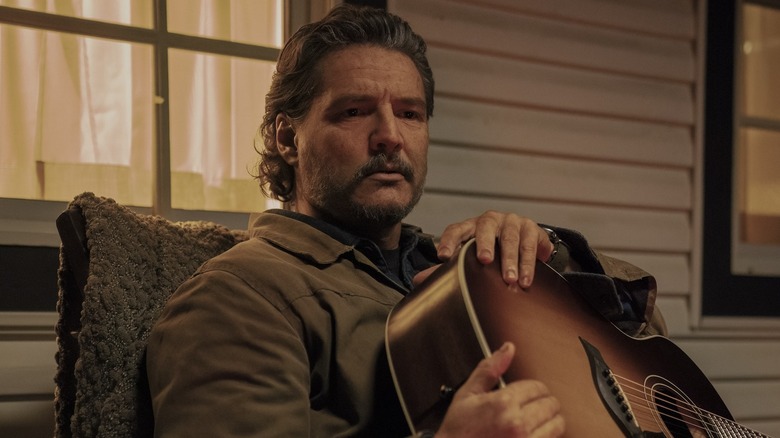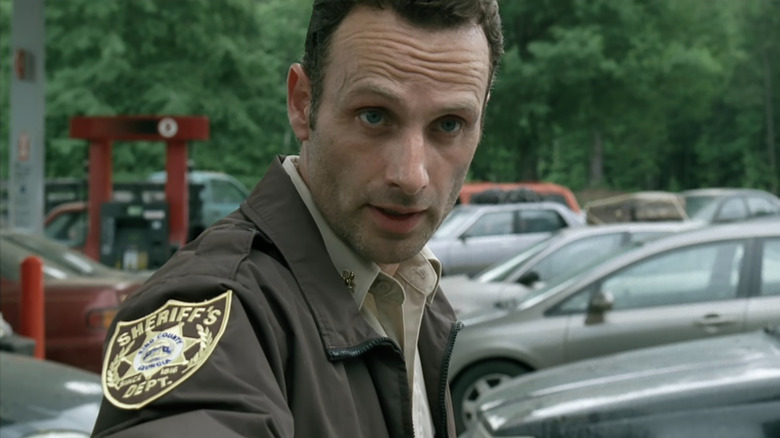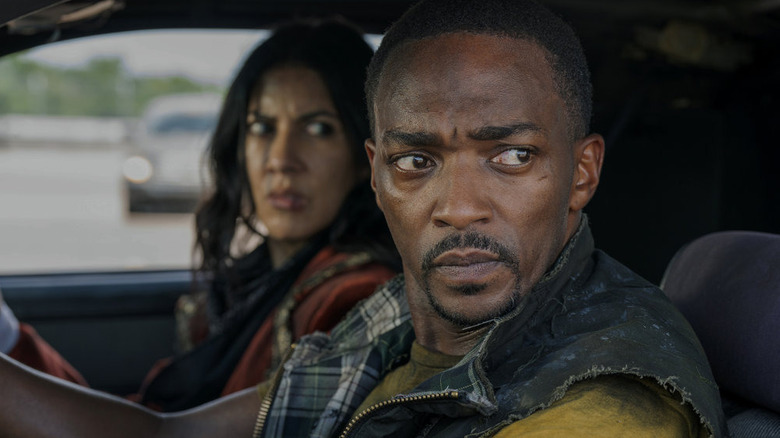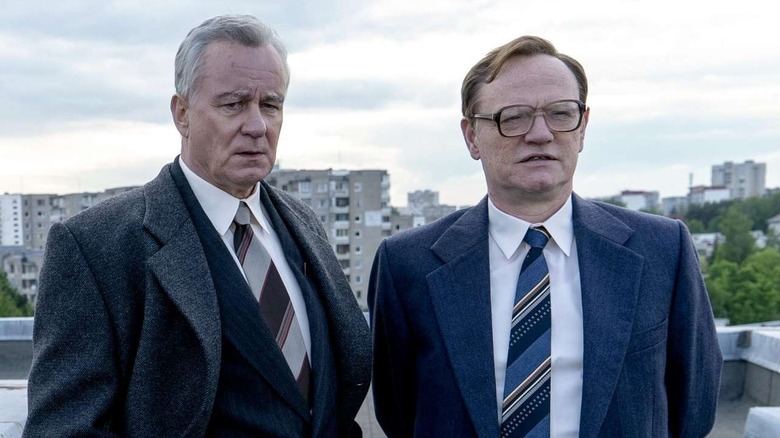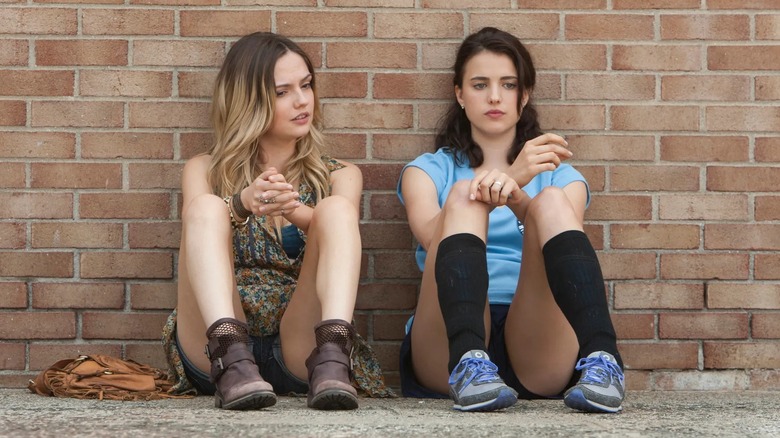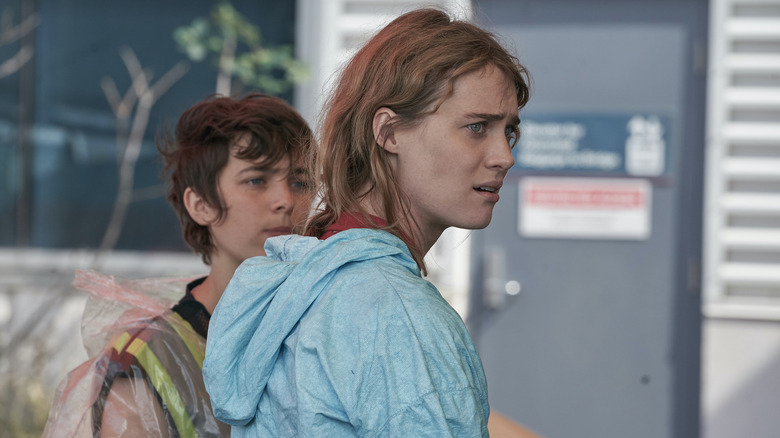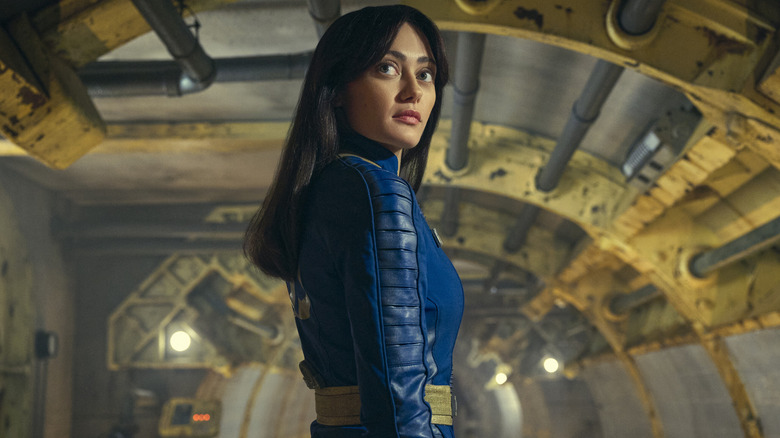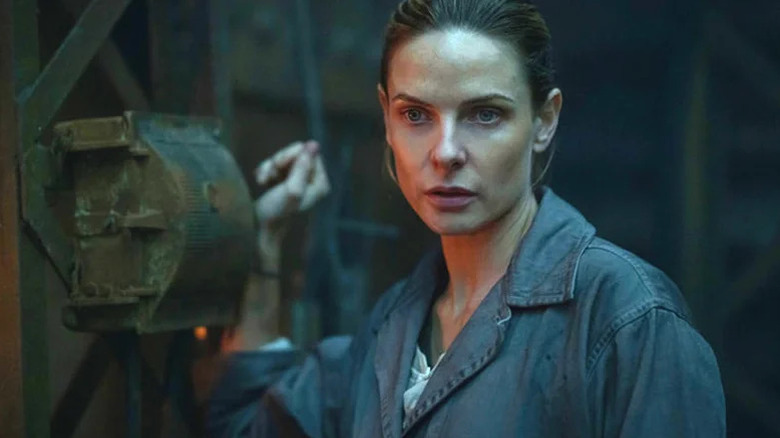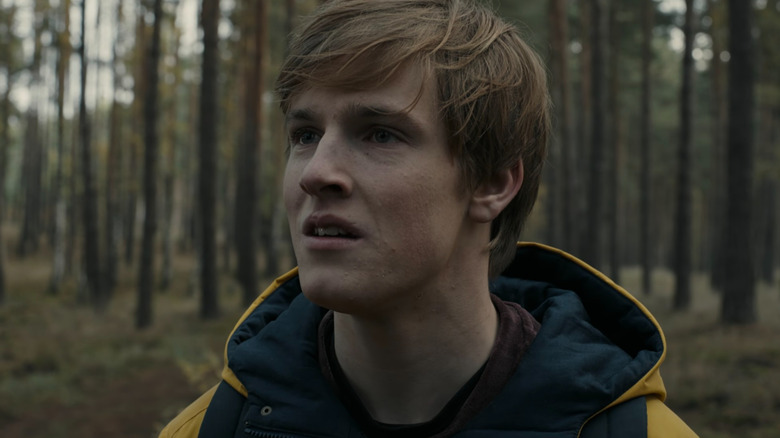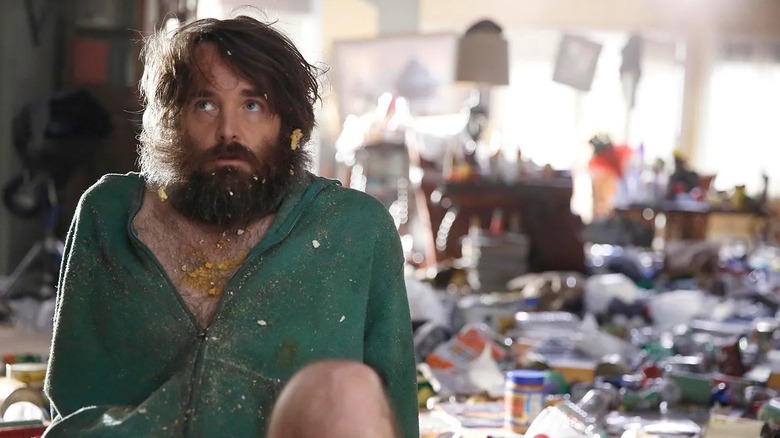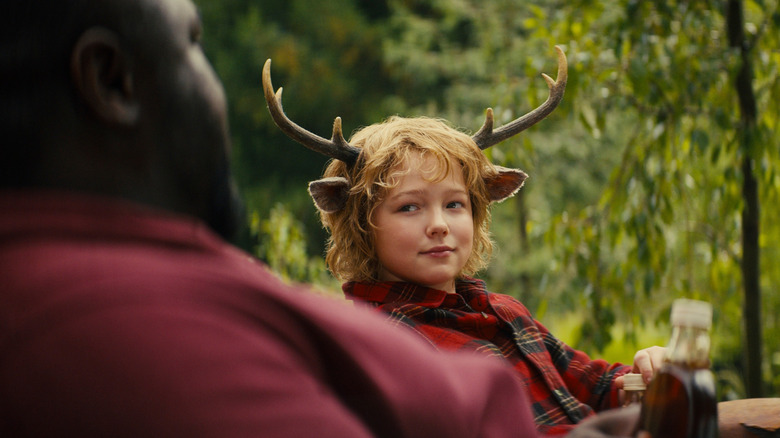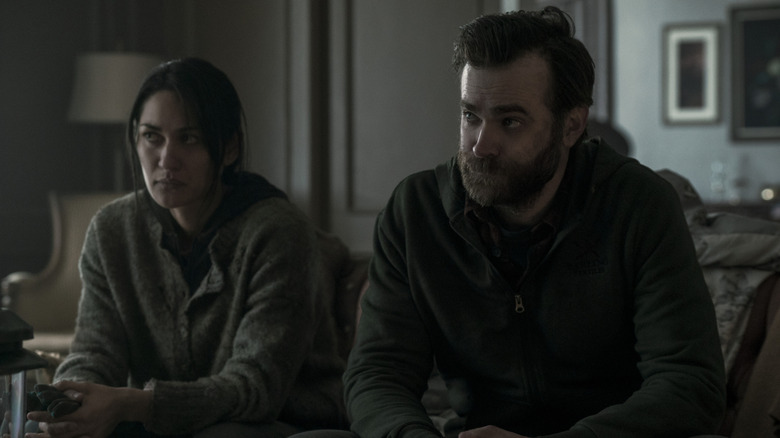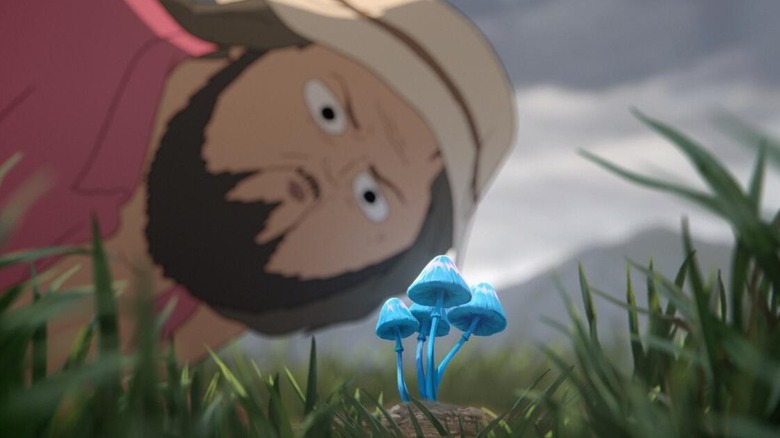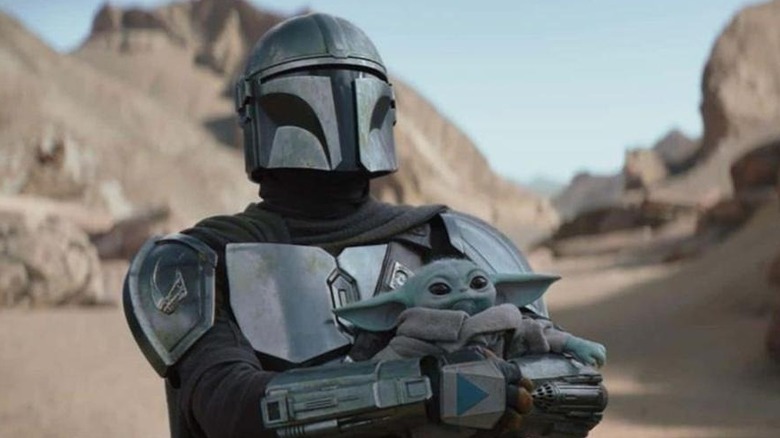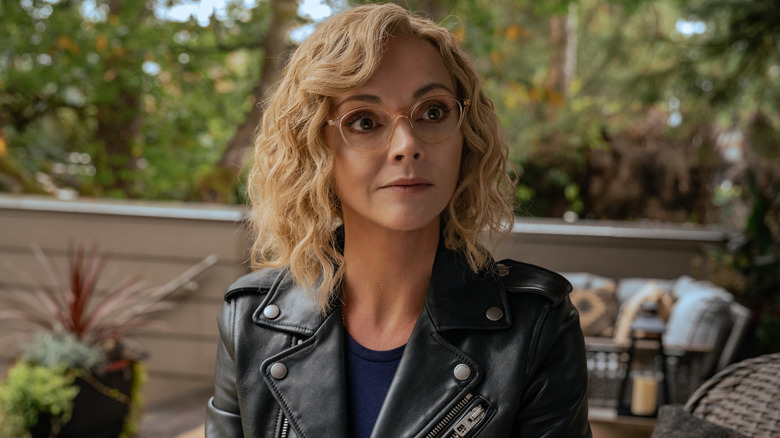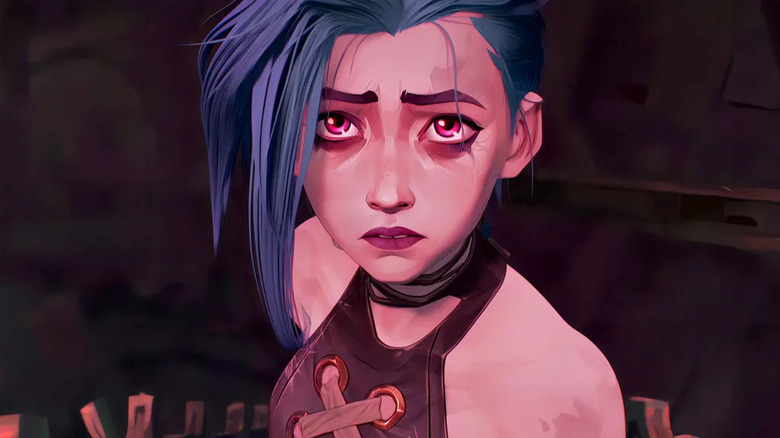15 TV Shows To Watch If You Like The Last Of Us
As a video game, "The Last of Us" sends players on a tumultuous journey where you're forced to choose between morally gray options as you try to survive in an apocalyptic world. As a TV series, "The Last of Us" brings all of those disturbing moments from the games to life, leaving you with no choice in the matter. All you can do is watch and hope that your favorite characters can survive the infected, as well as something far more dangerous — other humans.
Audiences have already been through the wringer watching Joel (Pedro Pascal) and Ellie (Bella Ramsey) navigate the apocalypse in the hit HBO show, losing ample allies along the way. It's understandable if you want to watch something tonally opposite from "The Last of Us" if you need to unwind a bit. But for those of you with absolute resolve, there are plenty of other gripping apocalypse shows like "The Last of Us" to check out. We've even added a few other stellar video game adaptations to this list for good measure.
The Walking Dead
"The Last of Us" doesn't have zombies, per se. The infected are a result of a cordyceps fungal infection, but if they bite you, you turn into one of them. So, for all intents and purposes, they're zombies, and anyone looking for a great zombie apocalypse show needs to get their teeth stuck into "The Walking Dead." Given its impressive 11-season run, "The Walking Dead" timeline can be tricky to navigate, but it's totally worth it, especially if you're a fan of "The Last of Us." But what's it all about
Rick Grimes (Andrew Lincoln) awakens from a coma in the midst of the zombie apocalypse and leads a group of survivors, including his family, to safety. Of course, safety never lasts long when there are as many regular people who are just as dangerous as the undead. The mainline series had its peaks and valleys over its run, but "The Walking Dead" remains peak television for zombie lovers, and you have all of the action and horror present in "The Last of Us." They even deal with similar themes, like finding purpose in a world where survival is often all people are thinking about.
Twisted Metal
As a video game, "The Last of Us" was lauded for its in-depth storyline. The "Twisted Metal" games were never too concerned with continuity or having strong thematic resonance. They were always more focused on vehicular carnage, as you select a driver and use your skills to knock out all of your opponents. The "Twisted Metal" Peacock series doesn't skimp on the wreckage, but what's most surprising is the heart and humor that's been added.
Set in a divided United States, "Twisted Metal" sees amnesiac John Doe (Anthony Mackie) trying to deliver a package to gain sanctuary at one of the few safe areas left in the country. Later, he and Quiet (Stephanie Beatriz) enter a tournament to gain a wish from the mysterious Calypso (Anthony Carrigan). There's no shortage of gore, but what'll keep you invested is the central connection between John and Quiet, as they realize that, even in an apocalypse, the most important resource humanity has is community.
Chernobyl
"Chernobyl," a 2019 miniseries about the 1986 nuclear power plant disaster and its aftermath, may seem like an odd pick for a list of shows like "The Last of Us," but it makes more sense than you think: It's also a story about humans trying to survive and piece their lives back together in the face of danger and uncertainty. What the acclaimed miniseries gets right is its focus on the survivors of the Chernobyl disaster. The horror stems just as much from the corruption that led to the meltdown in the first place as it does from the event itself.
There's also a key line in the show where Valery Legasov (played by Jared Harris, who won the BAFTA award for best actor for his performance) says, "What is the cost of lies?" The idea is that an easy lie today becomes a harsh truth tomorrow. This notion of lies corrupting relationships plays a big role in the ending of "The Last of Us" Season 1, where Joel misleads Ellie about the truth of what occurs in the finale. Both shows explore similar themes and both are gripping from start to finish.
The Leftovers
There's a reason apocalypse stories remain relevant. Regardless of what the actual apocalyptic event is, these stories hone in on what really matters to people once you strip away societal roles and monetary systems. "The Leftovers" doesn't have zombies; instead, it takes place several years after a cataclysmic event that saw 2% of the world's population mysteriously vanish. On paper, that's nowhere near as traumatizing as your typical apocalypse scenario, but what plays out afterward is absolutely fascinating.
"The Leftovers" is a better show than most people think because of the manner in which it explores grief and loss. Another great thing about it is that it keeps its cards close to its chest in terms of big-picture answers. The characters have no idea what happened to all those vanished people, which leaves a vacuum for cults to crop up and take advantage of a world that doesn't know how to proceed. It's not a show for anyone interested in unraveling the central mystery and getting a clear-cut answer by the end. Instead, it's there to challenge your personal mindset and make you consider how you would respond to such an event, things that fans of "The Last of Us" are bound to enjoy.
Station Eleven
Based on the novel of the same name by Emily St. John Mandel, "Station Eleven" takes place in a world decades removed from a pandemic that significantly reduced the population. The fact that this show debuted in 2021 amid the COVID-19 pandemic likely made a lot of people steer clear, with the plot hitting too close to home amid a time of global strife. However, "Station Eleven" was precisely the piece of dystopian fiction that deserved an adaptation at the time, showing everyone how the most vital part of any society is community and that art can be a tool for good.
"Station Eleven" isn't a walk in the park. There's incalculable grief as well as a violent cult (cults and apocalypses seem to go hand-in-hand), but "Station Eleven" sets itself apart from similar TV shows by being oddly hopeful. The world has changed, but as long as we band together, it doesn't seem as bleak. That's a message that will feel familiar to fans of "The Last of Us," who will no doubt enjoy this critically acclaimed HBO miniseries, which boasts a near-perfect 98% rating on Rotten Tomatoes.
Fallout
"Fallout" isn't on this list purely because it's another great video game adaptation — it's also another apocalypse story, albeit one that takes place centuries in the future and has a decidedly different tone. "The Last of Us" is a bit of a gloomy watch, whereas "Fallout" has a far more kinetic energy. Things get ridiculous and silly as Lucy (Ella Purnell), a Vault dweller who's been cooped up inside all her life, suddenly has to go to the surface to locate her father. She quickly learns that the surface world is even more wild than she thought, with various warring factions and unimaginable creatures.
When Looper spoke with "Fallout" executive producer Jonathan Nolan about what made the franchise appealing to him, he mentioned how it just "goes there." That sums up this show succinctly. "Fallout" isn't afraid to delve into the dark side of humanity with a dark sense of humor. You'll see something disgusting and then something hilarious within a few seconds of one another. However, despite their differences, the overall message of both shows is very similar, and fans of "The Last of Us" will quickly fall in love with "Fallout."
Silo
There's something apocalyptic shows like "The Last of Us" tend to have in common, and it's a search for community. Oftentimes, characters are looking to get away from whatever grand danger exists and simply want to live their lives peacefully. The Apple TV+ series "Silo" begins with relative normalcy, as society now exists within a giant silo that houses 10,000 people. They're safe there — or so they think. Eventually, they begin to wonder if the myriad rules put in place for their "protection" are really meant to protect them at all.
The world-building in "Silo" is second-to-none, and the show fleshes out its main cast incredibly well the longer it goes. It also explores themes related to the cost of maintaining some semblance of order in a world where civilization as we know it has collapsed. Is society worth saving if it involves giving up essential freedoms in favor of a totalitarian regime? Like "The Last of Us," "Silo" explores the idea of misinformation and whether relationships can survive when founded on lies. And, also like "The Last of Us," it does justice to its source material — "Silo" is based on a series of books by Hugh Howey.
Dark
Any fans of "The Last of Us" wanting more thematically-complex and family-driven stories would do well to consider the German series "Dark" on Netflix. It's not an apocalyptic story but instead focuses on how families are impacted by missing children, though this is ultimately a science fiction mystery series: The answers are related to a wormhole within a cave and time travel. "Dark" can become complicated quickly, but it's worth sticking with this show through all the twists and turns because it's a rewarding experience.
"Dark" isn't outright scary like a lot of other shows on this list. There aren't any zombies that'll jump out at you. Where it will appeal to fans of "The Last of Us" is in its themes of human connection and its craft — special attention deserves to go toward the cinematography, which creates an eerie, unsettling atmosphere. You may not jump out of your seat, but you'll feel a constant sense of existential unease, just like you get when watching "The Last of Us." Fans of the hit HBO show will quickly find themselves obsessed with the mysteries of Winden, the fictional German town in which "Dark" takes place.
The Last Man on Earth
Apocalypse shows aren't exactly known for being a barrel of laughs. They're usually downers, which makes the hilarious "The Last Man on Earth" a breath of fresh air. The series picks up with Phil Miller (Will Forte), who believes he's the sole survivor of a virus that wiped out all of humanity. However, slowly but surely, he begins meeting more survivors. His abrasive demeanor steadily rubs people the wrong way to the point where he's increasingly ostracized in what little is left of civilization.
Phil definitely gets insufferable at times, which is challenging for the other survivors. That's the thing about surviving an apocalyptic event — you don't get to decide who survives with you. "The Last Man on Earth" mines that for humor and the occasional heartfelt moment. It shows just how important community is even when everything has fallen apart. Despite being a comedy, "The Last Man on Earth" focuses on many of the same themes as "The Last of Us," making it great for fans of the HBO series who fancy something lighter.
Sweet Tooth
"Sweet Tooth" is like if you took an apocalypse show and combined it with a Steven Spielberg movie from the 1980s. The world has been ravaged by a plague that has killed most people, and around the same time the virus materialized, human-animal hybrids started being born. No one knows if the hybrids caused the virus or are actually just a product of it, but they're immune. This leads to widespread fear and people hunting hybrids, using them as scapegoats as humanity faces extinction.
There's a natural allegory within "Sweet Tooth" about how society will vilify certain groups when panic begins setting into the general population. The series deals with many heavy themes but is definitely more palatable for younger audiences than something like "The Last of Us." That being said, fans of the HBO series will no doubt enjoy the journey that deer-boy Gus (Christian Convery) takes with his new friend Tommy (Nonso Anozie) as they try to find a place where Gus and his fellow hybrids can find peace, which has a Joel and Ellie vibe to it.
Black Summer
"Black Summer" is a spinoff of "Z Nation," a zombie apocalypse series that aired on Syfy from 2014 to 2018. It's a fantastic show for fans of "The Last of Us," though we're recommending "Black Summer" here specifically because there's a lot that fans of the HBO show will love about it (and you don't need to have watched "Z Nation" to understand it). It's about a mother, Rose (Jaime King), getting separated from her daughter, Anna (Zoe Marlett). She fights her way through zombie hordes to be reunited with her.
Found families are common in dystopian shows. Oftentimes, people have lost their only loved ones, so they seek comfort in those they share common beliefs with in a post-apocalyptic landscape. That's the case in "The Last of Us," where Joel's daughter is killed early on but he finds comfort raising Ellie. What would "The Last of Us" be like if Joel's daughter was still alive and he had to fight through crowds of infected to find her once again? That's basically the set-up of "Black Summer," which also presents a very cynical view of humanity and how we might act when society breaks down.
Common Side Effects
The animated Adult Swim series "Common Side Effects" is a fascinating companion piece to "The Last of Us." In the latter, fungus causes humanity's devastation, leading to terrifying zombie-like creatures. In "Common Side Effects," fungus could actually hold the key to humanity's salvation. A guy named Marshall Cuso (Dave King) uncovers an astonishing new mushroom that can heal literally any health condition and even delay death itself. Of course, he wants everyone on the planet to benefit, but he has to contend with others who want the mushroom for their own purposes, whether it's to destroy it entirely or market and sell it to those who can afford a hefty price tag.
"Common Side Effects" isn't about the end of the world, but, like "The Last of Us," it examines the gray areas within mankind. Marshall initially doesn't want anything to do with massive corporations, but if he's going to manufacture the fungus on a global scale, he's going to need funding and assistance. He has an idealistic view of what he can do, but it quickly becomes bogged down in reality. "Common Side Effects" is one of the most nuanced TV series in recent memory, animated or otherwise, and it asks some important questions about the nature of our healthcare system.
The Mandalorian
If your favorite part of "The Last of Us" is Pedro Pascal, then "The Mandalorian" is a no-brainer for you. There's not much in the way of horror or existential dread within the Star Wars series, but if you've watched a few of the harder-hitting shows on this list and you're after something with a bit more escapism, this is the show for you. Of course, Pascal is more heard than seen on "The Mandalorian," with his character wearing a helmet. Even so, his presence is still captivating, which is a testament to him as an actor.
"The Mandalorian" follows a lone-wolf bounty hunter (Pascal's Din Djarin) who is hired to retrieve a child of Yoda's species but, instead of handing him over, decides to keep him safe from those who want him for nefarious purposes. Both shows actually have similar plots, with Pascal assuming a parental role for a smaller figure with extraordinary abilities (Grogu has the Force, Ellie can't get infected). You don't even need to be a big Star Wars fan to enjoy "The Mandalorian," which in many ways is closer to a Western series than outright science fiction or fantasy.
Yellowjackets
"Yellowjackets" isn't about an apocalypse, but it does explore what happens when the shackles of civilized society come off. We follow two separate timelines: There's the 1996 story, where a girls soccer team winds up marooned in the wilderness for 19 months, and the present day story, where the survivors continue to pick up the pieces from what they endured all those years ago — and it's this part of the story that "The Last of Us" fans will click with.
"Yellowjackets" is also a great watch for fans of "The Last of Us" because of the way it explores young women coming of age in unsafe and highly stressful situations. "The Last of Us" Season 1 sees Ellie as a 14 year old girl who believes she's meant for a grander purpose (finding a cure), but, in Season 2, she's dealing with the loss of that purpose and Joel lying to her. "Yellowjackets" is all about how these adult women can't move on from what they've done and seen, making it an engrossing watch for Ellie fans.
Arcane
"The Last of Us" definitely played a role in changing perceptions when it comes to video game adaptations, which had a bad reputation for decades thanks to early catastrophes like 1993's "Super Mario Bros." and 1994's "Street Fighter." Another show that forced people to start taking video game adaptations seriously is "Arcane," which blew up on Netflix when it debuted in 2021.
While "The Last of Us" had a great story to adapt already, "Arcane" is pretty different from "League of Legends," the multiplayer online battle arena video game on which it's based. The creators had a lot of wiggle room, and through exceptional animation and great voice-acting performances from Ella Purnell and Hailee Steinfeld, it became its own thing entirely. If "The Last of Us" presents the value of a one-to-one adaptation, "Arcane" shows how a great writing team can take a game and do something wildly different to great acclaim. Both are must-watch shows for gamers.
